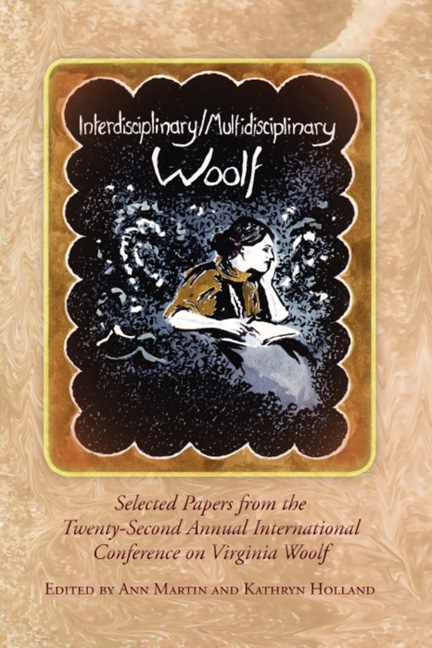Book contents
- Frontmatter
- Contents
- Introduction to Interdisciplinary/Multidisciplinary Woolf
- Acknowledgments
- List of Abbreviations
- History, Materiality, Multiplicity
- Patterns, Practices, Principles
- “Waving to Virginia”
- Woolf, Defoe, Derrida: Interdisciplinary dogs—or the canine aesthetics and (gender) politics of creativity
- “The law is on the side of the normal”: Virginia Woolf as Crip Theorist
- A Healing Centre of One's Own: Woolf's Legacy and Public Responses to Child Abuse
- Sunflower Suture: Disseminating the Garden in The Years
- “One Must Be Scientific”: Natural History and Ecology in Mrs. Dalloway
- Clarissa's Glacial Skepticism: John Tyndall and “Deep Time” in Mrs. Dalloway
- Apollonian Illusion and Dionysian Truth in Mrs. Dalloway
- Art, Influence, Embodiment
- Publishing, Politics, Publics
- Notes on Contributors
- Conference Program
“One Must Be Scientific”: Natural History and Ecology in Mrs. Dalloway
from Patterns, Practices, Principles
- Frontmatter
- Contents
- Introduction to Interdisciplinary/Multidisciplinary Woolf
- Acknowledgments
- List of Abbreviations
- History, Materiality, Multiplicity
- Patterns, Practices, Principles
- “Waving to Virginia”
- Woolf, Defoe, Derrida: Interdisciplinary dogs—or the canine aesthetics and (gender) politics of creativity
- “The law is on the side of the normal”: Virginia Woolf as Crip Theorist
- A Healing Centre of One's Own: Woolf's Legacy and Public Responses to Child Abuse
- Sunflower Suture: Disseminating the Garden in The Years
- “One Must Be Scientific”: Natural History and Ecology in Mrs. Dalloway
- Clarissa's Glacial Skepticism: John Tyndall and “Deep Time” in Mrs. Dalloway
- Apollonian Illusion and Dionysian Truth in Mrs. Dalloway
- Art, Influence, Embodiment
- Publishing, Politics, Publics
- Notes on Contributors
- Conference Program
Summary
Mrs. Dalloway models an ecological understanding of human life and the non-human world, thus offering a corrective to harmful and outmoded scientific perspectives. The kind of science Woolf critiques is represented not only by the cold and imperialistic attitudes of Drs. Holmes and Bradshaw, but also by the attitudes of a Victorian botanist: Miss Helena Parry, Clarissa Dalloway's aunt. Troubling, damaging, inadequate approaches to understanding the natural world correspond with similar failures to understand, appreciate, or connect with the human world in a positive way. Opposing and surpassing these constrained and destructive versions of science are visionary understandings of human interconnection with the organic world, which are experienced primarily by Septimus Smith, and to a lesser degree by Clarissa Dalloway, and which point to the radical possibilities of scientific inquiry.
“She would paint, she would write,” Clarissa thinks of young Sally Seton, but the painter and writer in the novel is Miss Parry, with her watercolors and her little book. Miss Parry is a complex though virtually unstudied figure, a lover of the natural world who nevertheless exploits it, uprooting rare orchids and flattening them between pages. In Burma, she participates in Britain's imperialist abuse of colonized landscapes and people; at home, she is both a victim and an enforcer of her society's suppression of female agency. At Bourton, Clarissa remembers, her aunt “never liked discussion of anything” (32), while Sally challenged conventions at every turn. “Sally went out, picked hollyhocks, dahlias—all sorts of flowers that had never been seen together—cut their heads off, and made them swim on the top of water in bowls;” Aunt Helena “thought it wicked to treat flowers like that” (33). This seemingly hypocritical judgment from an uprooter of orchids is understandable if we infer that Miss Parry's botanical pursuits adhere to her society's rules of feminine behavior. Collecting botanical specimens is quite a different thing from decorating the dining table. It is unclear whether it is a greater sin against convention for Sally to behead the flowers or to have them associate with other species with whom they “had never been seen” before.
- Type
- Chapter
- Information
- Interdisciplinary/Multidisciplinary Woolf , pp. 127 - 131Publisher: Liverpool University PressPrint publication year: 2013



